Unit 4 Body Language Learning About Language 课件 (共31张)-高中英语人教版(2019)选择修必修第一册 (共32页PPT)
文档属性
| 名称 | Unit 4 Body Language Learning About Language 课件 (共31张)-高中英语人教版(2019)选择修必修第一册 (共32页PPT) |  | |
| 格式 | pptx | ||
| 文件大小 | 3.5MB | ||
| 资源类型 | 教案 | ||
| 版本资源 | 人教版(2019) | ||
| 科目 | 英语 | ||
| 更新时间 | 2025-05-27 21:12:00 | ||
图片预览

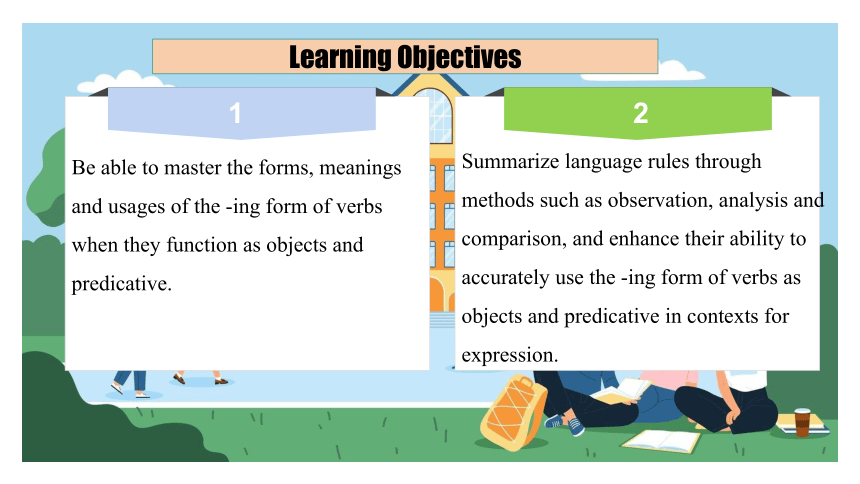
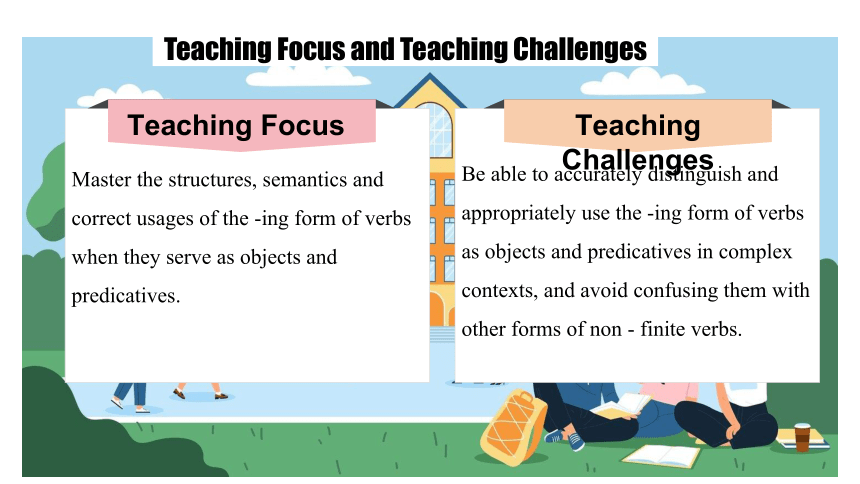
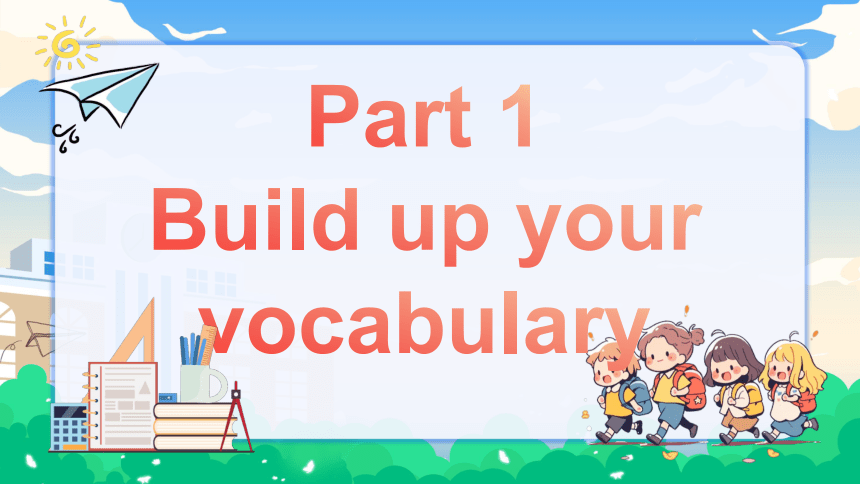
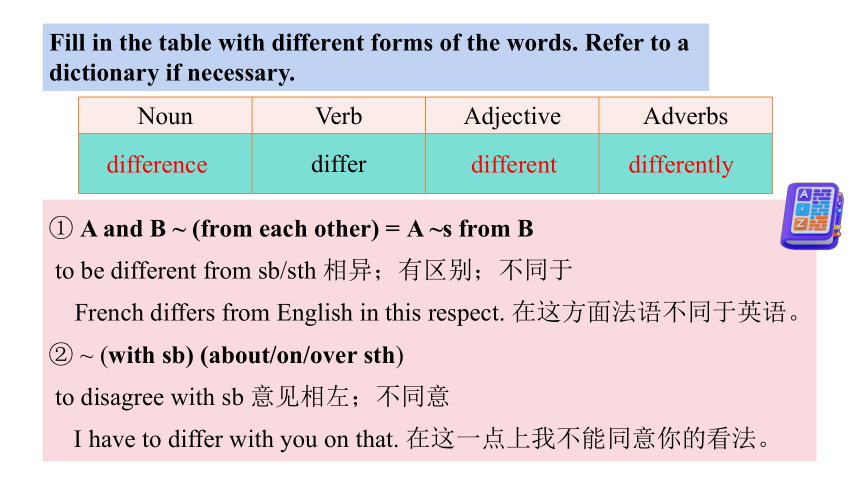
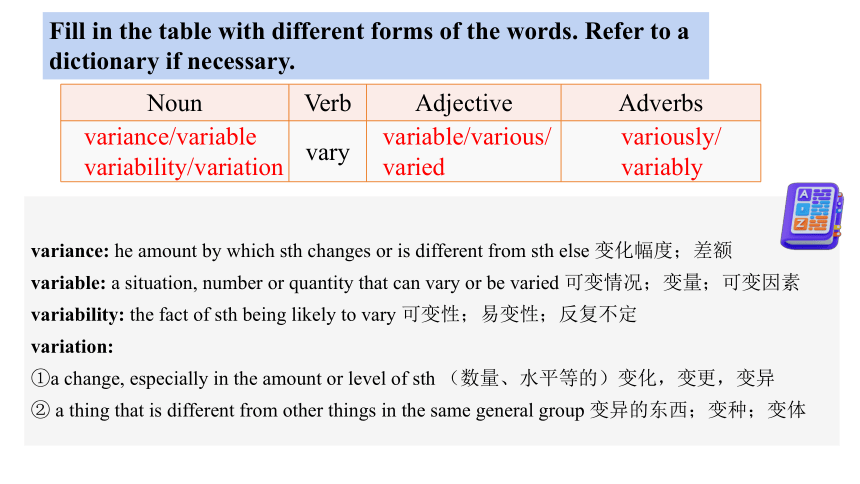
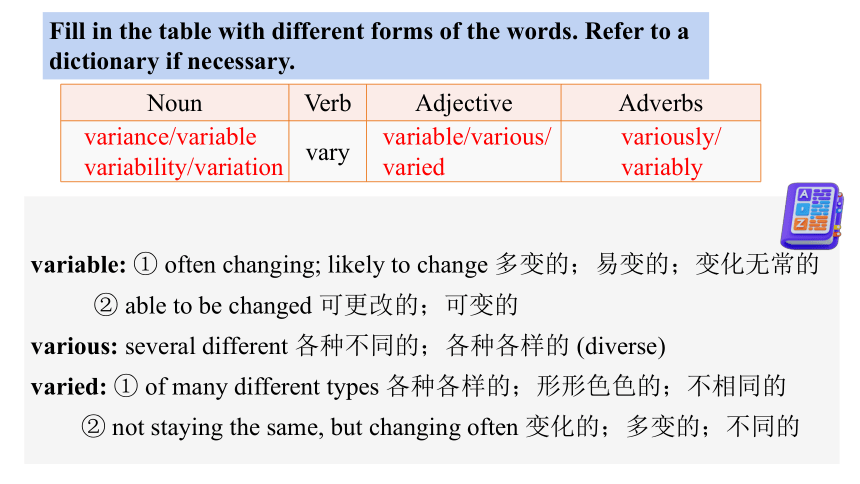
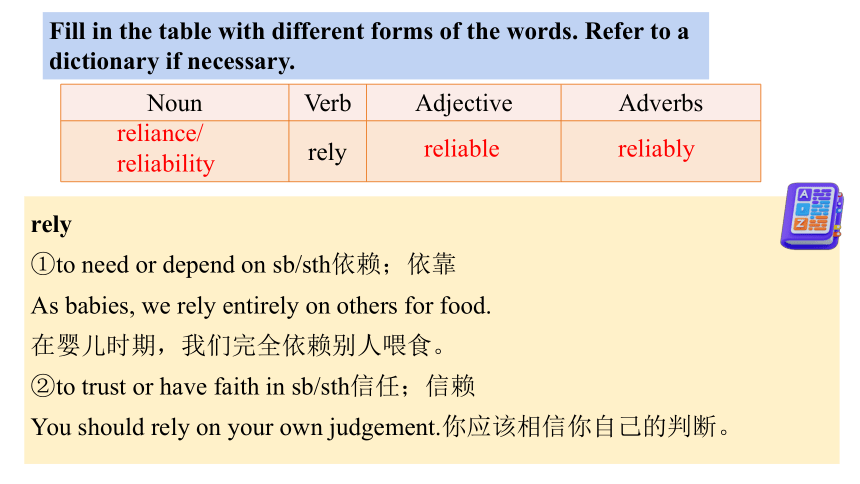

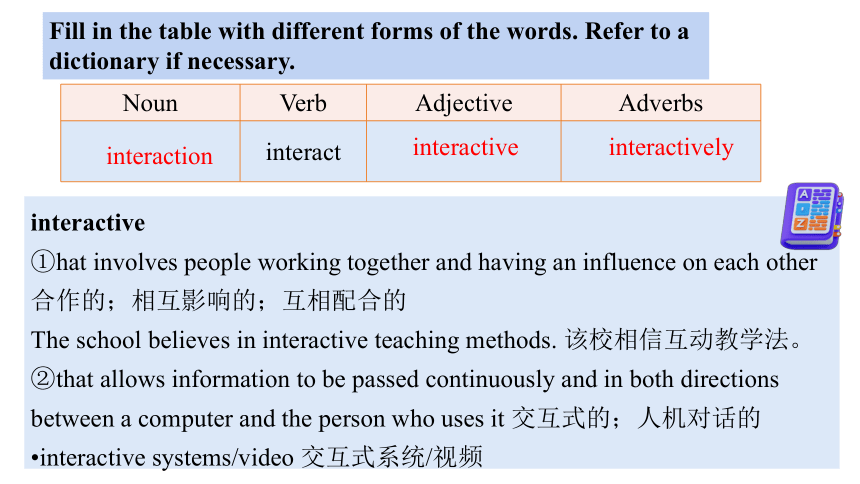

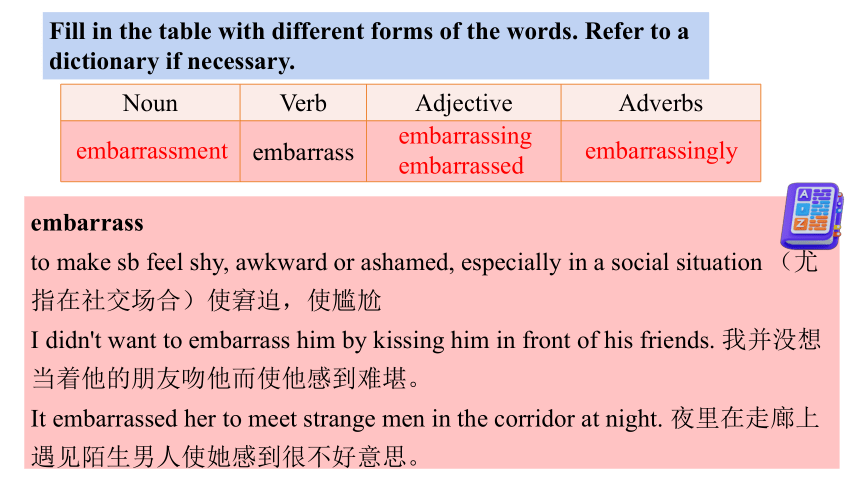
文档简介
(共31张PPT)
Unit 4
Body Language
Learning About Language
1
Be able to master the forms, meanings and usages of the -ing form of verbs when they function as objects and predicative.
2
Summarize language rules through methods such as observation, analysis and comparison, and enhance their ability to accurately use the -ing form of verbs as objects and predicative in contexts for expression.
Learning Objectives
Teaching Focus
Master the structures, semantics and correct usages of the -ing form of verbs when they serve as objects and predicatives.
Teaching Challenges
Be able to accurately distinguish and appropriately use the -ing form of verbs as objects and predicatives in complex contexts, and avoid confusing them with other forms of non - finite verbs.
Teaching Focus and Teaching Challenges
Part 1
Build up your vocabulary
Fill in the table with different forms of the words. Refer to a dictionary if necessary.
Noun Verb Adjective Adverbs
differ
difference
different
differently
① A and B ~ (from each other) = A ~s from B
to be different from sb/sth 相异;有区别;不同于
French differs from English in this respect. 在这方面法语不同于英语。
② ~ (with sb) (about/on/over sth)
to disagree with sb 意见相左;不同意
I have to differ with you on that. 在这一点上我不能同意你的看法。
Fill in the table with different forms of the words. Refer to a dictionary if necessary.
Noun Verb Adjective Adverbs
vary
variance/variable
variability/variation
variable/various/
varied
variously/
variably
variance: he amount by which sth changes or is different from sth else 变化幅度;差额
variable: a situation, number or quantity that can vary or be varied 可变情况;变量;可变因素
variability: the fact of sth being likely to vary 可变性;易变性;反复不定
variation:
①a change, especially in the amount or level of sth (数量、水平等的)变化,变更,变异
② a thing that is different from other things in the same general group 变异的东西;变种;变体
Fill in the table with different forms of the words. Refer to a dictionary if necessary.
Noun Verb Adjective Adverbs
vary
variance/variable
variability/variation
variable/various/
varied
variously/
variably
variable: ① often changing; likely to change 多变的;易变的;变化无常的
② able to be changed 可更改的;可变的
various: several different 各种不同的;各种各样的 (diverse)
varied: ① of many different types 各种各样的;形形色色的;不相同的
② not staying the same, but changing often 变化的;多变的;不同的
Fill in the table with different forms of the words. Refer to a dictionary if necessary.
Noun Verb Adjective Adverbs
rely
rely
①to need or depend on sb/sth依赖;依靠
As babies, we rely entirely on others for food.
在婴儿时期,我们完全依赖别人喂食。
②to trust or have faith in sb/sth信任;信赖
You should rely on your own judgement.你应该相信你自己的判断。
reliance/
reliability
reliable
reliably
Fill in the table with different forms of the words. Refer to a dictionary if necessary.
Noun Verb Adjective Adverbs
interact
interact
①to communicate with sb, especially while you work, play or spend time with them 交流;沟通;合作
Teachers have a limited amount of time to interact with each child.
②if one thing interacts with another, or if two things interact , the two things have an effect on each other 相互影响;相互作用
Perfume interacts with the skin's natural chemicals.
interaction
interactive
interactively
Fill in the table with different forms of the words. Refer to a dictionary if necessary.
Noun Verb Adjective Adverbs
interact
interactive
①hat involves people working together and having an influence on each other 合作的;相互影响的;互相配合的
The school believes in interactive teaching methods. 该校相信互动教学法。
②that allows information to be passed continuously and in both directions between a computer and the person who uses it 交互式的;人机对话的
interactive systems/video 交互式系统/视频
interaction
interactive
interactively
Fill in the table with different forms of the words. Refer to a dictionary if necessary.
Noun Verb Adjective Adverbs
approve
approve
①~ (of sb/sth)to think that sb/sth is good, acceptable or suitable赞成;同意
Do you approve of my idea 你同意我的想法吗?
②to officially agree to a plan, request, etc.批准,通过(计划、要求等)
The committee unanimously approved the plan.委员会一致通过了计划。
③to say that sth is good enough to be used, or is correct认可;核准
The course is approved by the Department for Education.课程已获教育部核准。
approval
approving/approved
approvingly
Fill in the table with different forms of the words. Refer to a dictionary if necessary.
Noun Verb Adjective Adverbs
embarrass
embarrass
to make sb feel shy, awkward or ashamed, especially in a social situation (尤指在社交场合)使窘迫,使尴尬
I didn't want to embarrass him by kissing him in front of his friends. 我并没想当着他的朋友吻他而使他感到难堪。
It embarrassed her to meet strange men in the corridor at night. 夜里在走廊上遇见陌生男人使她感到很不好意思。
embarrassment
embarrassing
embarrassed
embarrassingly
Work out the meanings of the underlined words in the sentences below. In pairs, list more words of the same kind.
1. I rest my head on the desk to get some rest.
v. to support sth by putting it on or against sth; to be supported in this way (被)支撑;(使)倚靠;托
Rest your head on my shoulder. 把头靠在我肩上。
Their bikes were resting against the wall. 他们的自行车靠在墙上。
n. ~ (from sth)a period of relaxing, sleeping or doing nothing after a period of activity 休息时间;睡眠时间
to have/take a rest from all your hard work 放下繁重的工作,休息一下
Work out the meanings of the underlined words in the sentences below. In pairs, list more words of the same kind.
2. The child displayed great interest in the huge fireworks display.
to show signs of sth, especially a quality or feeling 显示,显露,表现(特性或情感等)
I have rarely seen her display any sign of emotion.
我难得见到她将喜怒形于色。
an act of performing a skill or of showing sth happening, in order to entertain 展示;表演
a firework display 烟火表演
Read the passage about body language. Fill in the blanks with the correct forms of the words and phrases in the box.
by contrast by comparison break down interaction
demonstrate approve of clue gesture
When we think about nonverbal behaviour, or body language, we think about communication. When we think about communication, we think about ___________. So what is our body language _______________ to others Social scientists have spent a lot of time looking at the effects of our body language. We make assessments and inferences from body language. And according to those judgements we ___________ one person and dislike another. So body language provides external ___________ that are influenced by internal thoughts and feelings. Scientists have found that when
demonstrating
interaction
approve of
clues
Read the passage about body language. Fill in the blanks with the correct forms of the words and phrases in the box.
by contrast by comparison break down interaction
demonstrate approve of clue gesture
we feel proud and powerful, we usually straighten up to make ourselves bigger. ___________, when we feel powerless, we tend to slump, making ourselves smaller. It is obvious that our minds can influence our bodies. But is it also true that our bodies can affect our minds Scientific experiments show that if we make powerful __________ long enough, we may actually feel more powerful. People who remember to use positive body language are more likely to feel positive ___________, so some scientists suggest that we use our bodies to try power posing to help ___________ our feelings of shyness and powerlessness.
By contrast
gestures
by comparison
break down
Part 2
Discover useful structures
Lead-in
I enjoy watching movies on weekends.
My favorite activity is going hiking.
动名词
动词or名词?
Look at the examples below, paying attention to the italicised parts. Find other examples from the reading text.
She enjoys learning about body language in different cultures. (object)
The crucial thing is using body language in a way … (predicative)
However, you should avoid making this gesture in Brazil and Germany, as it
is not considered polite.
Elsewhere, people favour shaking hands, bowing from the waist, or nodding
the head when they meet someone else.
A good way of saying “I am full” is moving your hand in circles over your
stomach after a meal.
Perhaps the best example is smiling.
object
object
predicative
predicative
-ing 时态和语态
主 动 被 动
一般
完成
否定式 doing
being done
having done
having been done
not+-ing / not+having done
-ing 作宾语
考虑建议盼原谅: consider, suggest / advise, look forward to, pardon
承认推迟没得想: admit, delay / put off, fancy / imagine
避免错过继续练: avoid, miss, keep / keep on, practice
否认完成停能赏: deny, finish, stop, enjoy / appreciate
不禁介意准逃亡: can’t help, mind, allow / permit, escape
禁止冒险凭想象: forbid, risk, imagine
难以忍受始反对: can’t stand, set about / get down to, object to
想要成功坚持忙: feel like, succeed in, insist on, be busy (in) ...
习惯放弃有困难: get used to, give up, have difficulty / trouble (in) ...
导致专心不推迟: lead to / contribute to, be devoted to, put off
只能接-ing作宾语的动词
-ing 作宾语
只能接动名词作宾语的动词
常见的动介词搭配+-ing形式有:
be used to 习惯于 look forward to 盼望
can’t help 忍不住 be proud of 以……自豪
be responsible for 对……负责 insist on 坚持
keep on 继续 think of 考虑,想到
dream of 梦想 hear of 听说
prevent ... from 防止,阻止 keep ... from 防止,阻止
stop ... from 防止,阻止 be engaged in 从事于
depend on 依靠,依赖 thank ... for 因……而道谢
excuse ... for 因……而道歉 aim at 目的在于
-ing形式作介词宾语
-ing 作宾语
“allow”“advise”“”forbid“”“permit” 这几个动词后面的宾语形式有特定规则。当这些动词后直接接宾语时,要用动名词形式;而当有名词或代词作宾语时,则需构成 “allow/advise/forbid/permit + 名词 / 代词 + 不定式(作宾语补足语)”的结构。
The school forbids smoking on campus.
学校禁止在校园内吸烟。
Our teacher doesn't allow us to cheat.
老师不允许我们作弊。
smoke是forbid的直接宾语
us是代词,不定式to cheat是宾补
特定形式
注意
动词 宾语的形式 意义
forget to do 忘记做……
doing 忘记做过……
remember to do 记着要去做……
doing 记得做过……
regret to do 遗憾/抱歉要做……
doing 后悔做了……
动词 宾语的形式 意义
try to do 尽力做……
doing 尝试做……
mean to do 打算做……
doing 意味着……
go on to do 接着做(另外一件事)
doing 接着做(同一件事)
stop to do 停下来去做某事
doing 停止做某事
-ing 作表语
① 说明主语的身份或性质(泛指某种行为或动作)
My greatest happiness is serving the people.
我的最大幸福是为人民服务。
② 表示主语的具体内容(与主语指同一件事)
The main challenge is finding enough time. 主要挑战是找到足够的时间。
③描述主语的特征(相当于形容词,修饰事物)
The test result is disappointing. 考试成绩令人失望。
作用
-ing 作表语
-ing形式用来描述事物的特征,表示“令人……的”;
-ed形式用来描述人的感受,表示“感到……的”。
The news was shocking. 这个消息令人震惊。
I am excited about the trip. 我对这次旅行感到兴奋。
-ing VS -ed
exciting 令人激动的 excited 兴奋的
interesting 使人感兴趣的 interested 感兴趣的
disappointing 令人失望的 disappointed 感到失望的
encouraging 令人鼓舞的 encouraged 感到鼓舞的
puzzling 令人费解的 puzzled 感到费解的
satisfying 令人满意的 satisfied 感到满意的
Part 3
Exercise
Complete the sentences using the -ing form of the words and phrases in the box. Two are extra. Then state their functions.
amuse teach break down call on bow get through assess
1. Bill’s job is ________ sign language.
2. The theme of his presentation is _____________ barriers between groups.
3. By _______, we mean “bending our head or body forward as a sign of respect or shame”.
4. _____________ three kilometres of heavy traffic took me almost 25 minutes.
5. We intended to visit the theme park but ended up _________ Professor Zhang.
teaching
breaking down
bowing
Getting through
calling on
predicative
predicative
object
subject
adverbial
Complete the passage with the correct forms of the words and phrases in the box.
lie challenge consider individual differences maintain
consider the whole picture evaluate a patient’s condition
Reading body language is not an easy task. It can be __________ because interpreting the signs that another shows requires ________________________. In this sense, it can be compared to a doctor ___________________________.
_____________________________ is also key to reading people’s body language accurately. For example, when ______, some people avoid eye contact. By contrast, others may ________ eye contact even longer than usual.
challenging
considering the whole picture
evaluating a patient’s condition
Considering individual differences
lying
maintain
Homework
1. Summarise what we have learnt in this lesson;
2. Prepare for the next lesson
See you next time!
Unit 4
Body Language
Learning About Language
1
Be able to master the forms, meanings and usages of the -ing form of verbs when they function as objects and predicative.
2
Summarize language rules through methods such as observation, analysis and comparison, and enhance their ability to accurately use the -ing form of verbs as objects and predicative in contexts for expression.
Learning Objectives
Teaching Focus
Master the structures, semantics and correct usages of the -ing form of verbs when they serve as objects and predicatives.
Teaching Challenges
Be able to accurately distinguish and appropriately use the -ing form of verbs as objects and predicatives in complex contexts, and avoid confusing them with other forms of non - finite verbs.
Teaching Focus and Teaching Challenges
Part 1
Build up your vocabulary
Fill in the table with different forms of the words. Refer to a dictionary if necessary.
Noun Verb Adjective Adverbs
differ
difference
different
differently
① A and B ~ (from each other) = A ~s from B
to be different from sb/sth 相异;有区别;不同于
French differs from English in this respect. 在这方面法语不同于英语。
② ~ (with sb) (about/on/over sth)
to disagree with sb 意见相左;不同意
I have to differ with you on that. 在这一点上我不能同意你的看法。
Fill in the table with different forms of the words. Refer to a dictionary if necessary.
Noun Verb Adjective Adverbs
vary
variance/variable
variability/variation
variable/various/
varied
variously/
variably
variance: he amount by which sth changes or is different from sth else 变化幅度;差额
variable: a situation, number or quantity that can vary or be varied 可变情况;变量;可变因素
variability: the fact of sth being likely to vary 可变性;易变性;反复不定
variation:
①a change, especially in the amount or level of sth (数量、水平等的)变化,变更,变异
② a thing that is different from other things in the same general group 变异的东西;变种;变体
Fill in the table with different forms of the words. Refer to a dictionary if necessary.
Noun Verb Adjective Adverbs
vary
variance/variable
variability/variation
variable/various/
varied
variously/
variably
variable: ① often changing; likely to change 多变的;易变的;变化无常的
② able to be changed 可更改的;可变的
various: several different 各种不同的;各种各样的 (diverse)
varied: ① of many different types 各种各样的;形形色色的;不相同的
② not staying the same, but changing often 变化的;多变的;不同的
Fill in the table with different forms of the words. Refer to a dictionary if necessary.
Noun Verb Adjective Adverbs
rely
rely
①to need or depend on sb/sth依赖;依靠
As babies, we rely entirely on others for food.
在婴儿时期,我们完全依赖别人喂食。
②to trust or have faith in sb/sth信任;信赖
You should rely on your own judgement.你应该相信你自己的判断。
reliance/
reliability
reliable
reliably
Fill in the table with different forms of the words. Refer to a dictionary if necessary.
Noun Verb Adjective Adverbs
interact
interact
①to communicate with sb, especially while you work, play or spend time with them 交流;沟通;合作
Teachers have a limited amount of time to interact with each child.
②if one thing interacts with another, or if two things interact , the two things have an effect on each other 相互影响;相互作用
Perfume interacts with the skin's natural chemicals.
interaction
interactive
interactively
Fill in the table with different forms of the words. Refer to a dictionary if necessary.
Noun Verb Adjective Adverbs
interact
interactive
①hat involves people working together and having an influence on each other 合作的;相互影响的;互相配合的
The school believes in interactive teaching methods. 该校相信互动教学法。
②that allows information to be passed continuously and in both directions between a computer and the person who uses it 交互式的;人机对话的
interactive systems/video 交互式系统/视频
interaction
interactive
interactively
Fill in the table with different forms of the words. Refer to a dictionary if necessary.
Noun Verb Adjective Adverbs
approve
approve
①~ (of sb/sth)to think that sb/sth is good, acceptable or suitable赞成;同意
Do you approve of my idea 你同意我的想法吗?
②to officially agree to a plan, request, etc.批准,通过(计划、要求等)
The committee unanimously approved the plan.委员会一致通过了计划。
③to say that sth is good enough to be used, or is correct认可;核准
The course is approved by the Department for Education.课程已获教育部核准。
approval
approving/approved
approvingly
Fill in the table with different forms of the words. Refer to a dictionary if necessary.
Noun Verb Adjective Adverbs
embarrass
embarrass
to make sb feel shy, awkward or ashamed, especially in a social situation (尤指在社交场合)使窘迫,使尴尬
I didn't want to embarrass him by kissing him in front of his friends. 我并没想当着他的朋友吻他而使他感到难堪。
It embarrassed her to meet strange men in the corridor at night. 夜里在走廊上遇见陌生男人使她感到很不好意思。
embarrassment
embarrassing
embarrassed
embarrassingly
Work out the meanings of the underlined words in the sentences below. In pairs, list more words of the same kind.
1. I rest my head on the desk to get some rest.
v. to support sth by putting it on or against sth; to be supported in this way (被)支撑;(使)倚靠;托
Rest your head on my shoulder. 把头靠在我肩上。
Their bikes were resting against the wall. 他们的自行车靠在墙上。
n. ~ (from sth)a period of relaxing, sleeping or doing nothing after a period of activity 休息时间;睡眠时间
to have/take a rest from all your hard work 放下繁重的工作,休息一下
Work out the meanings of the underlined words in the sentences below. In pairs, list more words of the same kind.
2. The child displayed great interest in the huge fireworks display.
to show signs of sth, especially a quality or feeling 显示,显露,表现(特性或情感等)
I have rarely seen her display any sign of emotion.
我难得见到她将喜怒形于色。
an act of performing a skill or of showing sth happening, in order to entertain 展示;表演
a firework display 烟火表演
Read the passage about body language. Fill in the blanks with the correct forms of the words and phrases in the box.
by contrast by comparison break down interaction
demonstrate approve of clue gesture
When we think about nonverbal behaviour, or body language, we think about communication. When we think about communication, we think about ___________. So what is our body language _______________ to others Social scientists have spent a lot of time looking at the effects of our body language. We make assessments and inferences from body language. And according to those judgements we ___________ one person and dislike another. So body language provides external ___________ that are influenced by internal thoughts and feelings. Scientists have found that when
demonstrating
interaction
approve of
clues
Read the passage about body language. Fill in the blanks with the correct forms of the words and phrases in the box.
by contrast by comparison break down interaction
demonstrate approve of clue gesture
we feel proud and powerful, we usually straighten up to make ourselves bigger. ___________, when we feel powerless, we tend to slump, making ourselves smaller. It is obvious that our minds can influence our bodies. But is it also true that our bodies can affect our minds Scientific experiments show that if we make powerful __________ long enough, we may actually feel more powerful. People who remember to use positive body language are more likely to feel positive ___________, so some scientists suggest that we use our bodies to try power posing to help ___________ our feelings of shyness and powerlessness.
By contrast
gestures
by comparison
break down
Part 2
Discover useful structures
Lead-in
I enjoy watching movies on weekends.
My favorite activity is going hiking.
动名词
动词or名词?
Look at the examples below, paying attention to the italicised parts. Find other examples from the reading text.
She enjoys learning about body language in different cultures. (object)
The crucial thing is using body language in a way … (predicative)
However, you should avoid making this gesture in Brazil and Germany, as it
is not considered polite.
Elsewhere, people favour shaking hands, bowing from the waist, or nodding
the head when they meet someone else.
A good way of saying “I am full” is moving your hand in circles over your
stomach after a meal.
Perhaps the best example is smiling.
object
object
predicative
predicative
-ing 时态和语态
主 动 被 动
一般
完成
否定式 doing
being done
having done
having been done
not+-ing / not+having done
-ing 作宾语
考虑建议盼原谅: consider, suggest / advise, look forward to, pardon
承认推迟没得想: admit, delay / put off, fancy / imagine
避免错过继续练: avoid, miss, keep / keep on, practice
否认完成停能赏: deny, finish, stop, enjoy / appreciate
不禁介意准逃亡: can’t help, mind, allow / permit, escape
禁止冒险凭想象: forbid, risk, imagine
难以忍受始反对: can’t stand, set about / get down to, object to
想要成功坚持忙: feel like, succeed in, insist on, be busy (in) ...
习惯放弃有困难: get used to, give up, have difficulty / trouble (in) ...
导致专心不推迟: lead to / contribute to, be devoted to, put off
只能接-ing作宾语的动词
-ing 作宾语
只能接动名词作宾语的动词
常见的动介词搭配+-ing形式有:
be used to 习惯于 look forward to 盼望
can’t help 忍不住 be proud of 以……自豪
be responsible for 对……负责 insist on 坚持
keep on 继续 think of 考虑,想到
dream of 梦想 hear of 听说
prevent ... from 防止,阻止 keep ... from 防止,阻止
stop ... from 防止,阻止 be engaged in 从事于
depend on 依靠,依赖 thank ... for 因……而道谢
excuse ... for 因……而道歉 aim at 目的在于
-ing形式作介词宾语
-ing 作宾语
“allow”“advise”“”forbid“”“permit” 这几个动词后面的宾语形式有特定规则。当这些动词后直接接宾语时,要用动名词形式;而当有名词或代词作宾语时,则需构成 “allow/advise/forbid/permit + 名词 / 代词 + 不定式(作宾语补足语)”的结构。
The school forbids smoking on campus.
学校禁止在校园内吸烟。
Our teacher doesn't allow us to cheat.
老师不允许我们作弊。
smoke是forbid的直接宾语
us是代词,不定式to cheat是宾补
特定形式
注意
动词 宾语的形式 意义
forget to do 忘记做……
doing 忘记做过……
remember to do 记着要去做……
doing 记得做过……
regret to do 遗憾/抱歉要做……
doing 后悔做了……
动词 宾语的形式 意义
try to do 尽力做……
doing 尝试做……
mean to do 打算做……
doing 意味着……
go on to do 接着做(另外一件事)
doing 接着做(同一件事)
stop to do 停下来去做某事
doing 停止做某事
-ing 作表语
① 说明主语的身份或性质(泛指某种行为或动作)
My greatest happiness is serving the people.
我的最大幸福是为人民服务。
② 表示主语的具体内容(与主语指同一件事)
The main challenge is finding enough time. 主要挑战是找到足够的时间。
③描述主语的特征(相当于形容词,修饰事物)
The test result is disappointing. 考试成绩令人失望。
作用
-ing 作表语
-ing形式用来描述事物的特征,表示“令人……的”;
-ed形式用来描述人的感受,表示“感到……的”。
The news was shocking. 这个消息令人震惊。
I am excited about the trip. 我对这次旅行感到兴奋。
-ing VS -ed
exciting 令人激动的 excited 兴奋的
interesting 使人感兴趣的 interested 感兴趣的
disappointing 令人失望的 disappointed 感到失望的
encouraging 令人鼓舞的 encouraged 感到鼓舞的
puzzling 令人费解的 puzzled 感到费解的
satisfying 令人满意的 satisfied 感到满意的
Part 3
Exercise
Complete the sentences using the -ing form of the words and phrases in the box. Two are extra. Then state their functions.
amuse teach break down call on bow get through assess
1. Bill’s job is ________ sign language.
2. The theme of his presentation is _____________ barriers between groups.
3. By _______, we mean “bending our head or body forward as a sign of respect or shame”.
4. _____________ three kilometres of heavy traffic took me almost 25 minutes.
5. We intended to visit the theme park but ended up _________ Professor Zhang.
teaching
breaking down
bowing
Getting through
calling on
predicative
predicative
object
subject
adverbial
Complete the passage with the correct forms of the words and phrases in the box.
lie challenge consider individual differences maintain
consider the whole picture evaluate a patient’s condition
Reading body language is not an easy task. It can be __________ because interpreting the signs that another shows requires ________________________. In this sense, it can be compared to a doctor ___________________________.
_____________________________ is also key to reading people’s body language accurately. For example, when ______, some people avoid eye contact. By contrast, others may ________ eye contact even longer than usual.
challenging
considering the whole picture
evaluating a patient’s condition
Considering individual differences
lying
maintain
Homework
1. Summarise what we have learnt in this lesson;
2. Prepare for the next lesson
See you next time!
